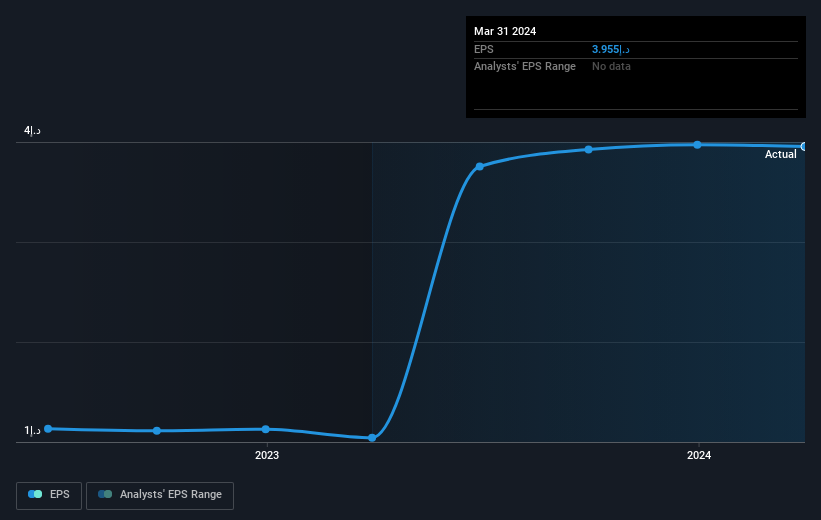Dubai Refreshment (P.J.S.C.)'s (DFM:DRC) earnings growth rate lags the 26% CAGR delivered to shareholders

It's been a soft week for Dubai Refreshment (P.J.S.C.) (DFM:DRC) shares, which are down 14%. But that doesn't change the fact that shareholders have received really good returns over the last five years. We think most investors would be happy with the 132% return, over that period. To some, the recent pullback wouldn't be surprising after such a fast rise. The more important question is whether the stock is too cheap or too expensive today.
In light of the stock dropping 14% in the past week, we want to investigate the longer term story, and see if fundamentals have been the driver of the company's positive five-year return.
View our latest analysis for Dubai Refreshment (P.J.S.C.)
In his essay The Superinvestors of Graham-and-Doddsville Warren Buffett described how share prices do not always rationally reflect the value of a business. By comparing earnings per share (EPS) and share price changes over time, we can get a feel for how investor attitudes to a company have morphed over time.
During five years of share price growth, Dubai Refreshment (P.J.S.C.) achieved compound earnings per share (EPS) growth of 50% per year. The EPS growth is more impressive than the yearly share price gain of 18% over the same period. So it seems the market isn't so enthusiastic about the stock these days. This cautious sentiment is reflected in its (fairly low) P/E ratio of 4.55.
You can see how EPS has changed over time in the image below (click on the chart to see the exact values).

Dive deeper into Dubai Refreshment (P.J.S.C.)'s key metrics by checking this interactive graph of Dubai Refreshment (P.J.S.C.)'s earnings, revenue and cash flow.
What About Dividends?
When looking at investment returns, it is important to consider the difference between total shareholder return (TSR) and share price return. Whereas the share price return only reflects the change in the share price, the TSR includes the value of dividends (assuming they were reinvested) and the benefit of any discounted capital raising or spin-off. So for companies that pay a generous dividend, the TSR is often a lot higher than the share price return. As it happens, Dubai Refreshment (P.J.S.C.)'s TSR for the last 5 years was 215%, which exceeds the share price return mentioned earlier. And there's no prize for guessing that the dividend payments largely explain the divergence!
A Different Perspective
It's nice to see that Dubai Refreshment (P.J.S.C.) shareholders have received a total shareholder return of 25% over the last year. That's including the dividend. However, that falls short of the 26% TSR per annum it has made for shareholders, each year, over five years. I find it very interesting to look at share price over the long term as a proxy for business performance. But to truly gain insight, we need to consider other information, too. Like risks, for instance. Every company has them, and we've spotted 3 warning signs for Dubai Refreshment (P.J.S.C.) (of which 2 shouldn't be ignored!) you should know about.
If you would prefer to check out another company -- one with potentially superior financials -- then do not miss this free list of companies that have proven they can grow earnings.
Please note, the market returns quoted in this article reflect the market weighted average returns of stocks that currently trade on Emirian exchanges.
New: Manage All Your Stock Portfolios in One Place
We've created the ultimate portfolio companion for stock investors, and it's free.
• Connect an unlimited number of Portfolios and see your total in one currency
• Be alerted to new Warning Signs or Risks via email or mobile
• Track the Fair Value of your stocks
Have feedback on this article? Concerned about the content? Get in touch with us directly. Alternatively, email editorial-team (at) simplywallst.com.
This article by Simply Wall St is general in nature. We provide commentary based on historical data and analyst forecasts only using an unbiased methodology and our articles are not intended to be financial advice. It does not constitute a recommendation to buy or sell any stock, and does not take account of your objectives, or your financial situation. We aim to bring you long-term focused analysis driven by fundamental data. Note that our analysis may not factor in the latest price-sensitive company announcements or qualitative material. Simply Wall St has no position in any stocks mentioned.
Have feedback on this article? Concerned about the content? Get in touch with us directly. Alternatively, email editorial-team@simplywallst.com
About DFM:DRC
Dubai Refreshment (P.J.S.C.)
Engages in bottling and selling Pepsi Cola International products in the United Arab Emirates and internationally.
Flawless balance sheet and fair value.
Market Insights
Community Narratives



